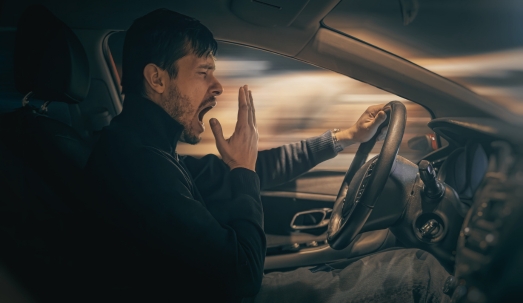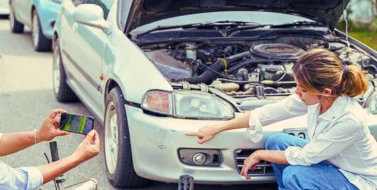Distracted driving is any activity that diverts a driver’s attention from driving. Types of distracted driving in Chicago can be broken down into three categories: manual, cognitive, and visual distractions. There are multiple activities responsible for taking a driver’s attention from the roadway, and they can all lead to serious emotional, physical, legal, and financial consequences.

Table of Contents
Types of Distracted Driving in Illinois
Drivers should be educated on the various types of distracted driving. There are three primary categories of distracted driving. The three classifications of distractions are manual, cognitive, and visual. A manual distraction causes a driver to remove his or her hands from the steering wheel. A cognitive distraction causes a driver’s mind to wander away from the task of responsible driving. Visual distractions cause drivers to remove their eyes from the road. Causes of distracted driving vary and can fall under more than one category.
Manual Distractions
Manual distractions are any actions causing a driver to take one or both of his or her hands off of the steering wheel. Examples of manual distractions include eating or drinking, smoking, pushing buttons or turning knobs, tending to a child, searching through bags, purses or wallets, grooming, and applying cosmetics.
Cognitive Distractions
Cognitive distractions take a driver’s mental focus off the task of driving. Examples of cognitive distractions include daydreaming, road rage, worry or stress-provoking thoughts, planning future tasks, talking to another passenger, phone communications, being under the influence of alcohol or drugs, and even drowsy driving.
Visual Distractions
Any distraction that influences a driver to take his or her eyes off the road falls under the visual distraction category.
Most Common Causes of Distracted Driving
Drives who possess knowledge of the common causes of distracted driving may be less likely to unintentionally engage in such activities. Solely focusing on the road is the first step to understanding how to prevent a distracted driving car accident. Many of the distractions listed fall into two of the three distracted driving categories. Some distractions, like texting and driving, can fall under all three. Some of the most common distracting behaviors include:
- Adjusting music, audio devices, or watching videos or reading
- Eating food or drinking beverages
- Grooming or applying cosmetics
- Searching for materials within the vehicle
- Text messaging, talking on a phone, or communicating with other passengers
- Using a phone, GPS, or navigation system to access information
Consequences of Driving While Distracted
Distracted driving is a dangerous violation of the law. If a driver is responsible for a car crash caused by distracted driving, he or she could face severe legal and financial consequences. The driver could also cause significant physical and emotional damages to injured victims.
Legal Ramifications
Drivers found in violation of any anti-distracted driving laws will be subject to a penalty. The majority of states will have the guilty driver pay a fine. In some cases, being convicted may include serving jail time. Another form of legal consequence (depending on the state) has drivers receive demerit points each time they are pulled over for distracted driving. After drivers accumulate a set number of points, their license may be suspended or revoked.
The consequences are considerably more severe should the driver be responsible for an accident while driving distracted. When another passenger or driver is injured due to distracting driving, the guilty party will face potential jail time. A driver may face vehicular manslaughter or homicide under the circumstance that the driver’s distractions lead to the death of a passenger, another driver, or a pedestrian.
Financial Ramifications
Drivers have a legal obligation to adhere to a standard of reasonable care while performing any actions that could foreseeably harm another individual. In the eyes of the law, a driver who violates this duty of care by engaging in distractions is committing an act of negligence.
Drivers found accountable for intentional negligence can be held liable for any damages resulting from said negligence. Damages can include medical bills, pain and suffering, lost wages, punitive damages, personal property damages, automotive property damages, and other out-of-pocket fees. Inattentive driving can put innocent lives at risk. When victims are injured by a distracted driver, they have the right to recover damages against his or her insurance policy.
Parents should be mindful of frightening facts on distracted driving and teenagers. If a teen is responsible for a distracted driving-related accident, the victims’ recovery may come from the parent’s assets. Parents can still be liable, regardless of whether they were present in the vehicle during the car collision. Insurance premiums increase for every ticket received for distracted driving. Insurance coverage policies can become expensive and certain states have higher rate increases for distracted driving violations.
Should You Hire a Lawyer for a Car Accident?
Recent studies show that victims who hire an attorney are likely to receive triple the amount of compensation as those who self-represent. Attorneys will gather all necessary documents to maximize an accident victim’s injury settlement. Information will include: police reports/supplements, eyewitness statements, photos/videos of the accident scene and vehicles involved, cellphone records, diagrams/data related to the location and accident, medical records, wage information, any defects or recalls regarding the vehicles involved, and any expert opinion necessary. By obtaining the above information, attorneys can prove who or what caused the accident, any parties who should be accountable for injuries, and how much an auto accident claim is worth. Car accident lawyers will handle communications between accident investigators, insurance adjusters, and representatives to guarantee accident victims do not fall prey to deceitful or unethical tactics that may minimize the value of their personal injury claim.
A car accident lawyer can assist victims in making the most out of their claims. Car accident victims have the right to recover compensation for the damages they sustain. Attorneys have the proper knowledge to ensure victims receive assistance to pay for medical bills, replace lost wages, and compensate for any pain and suffering.





